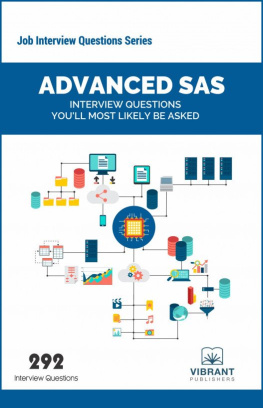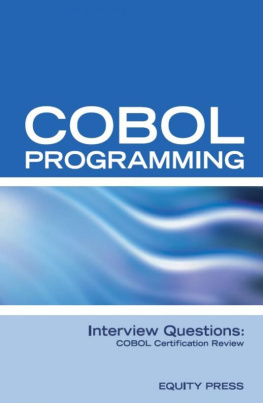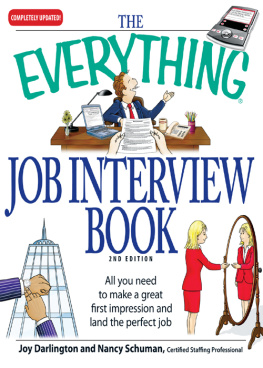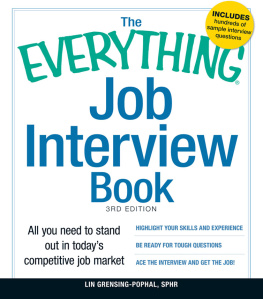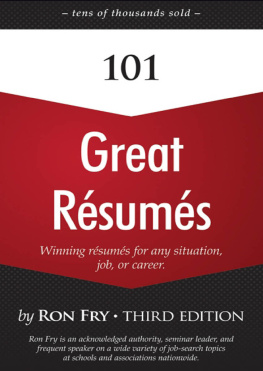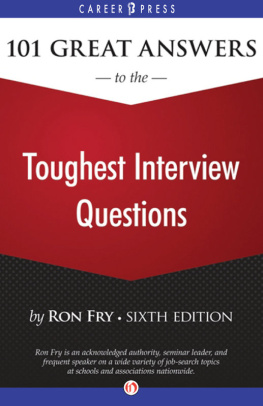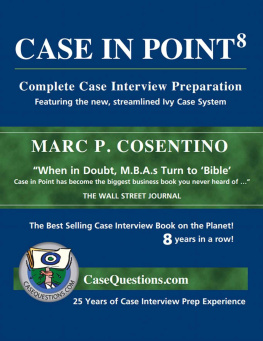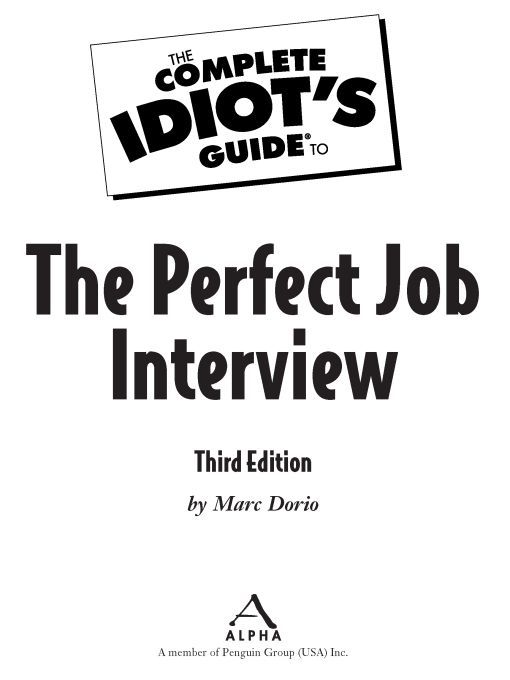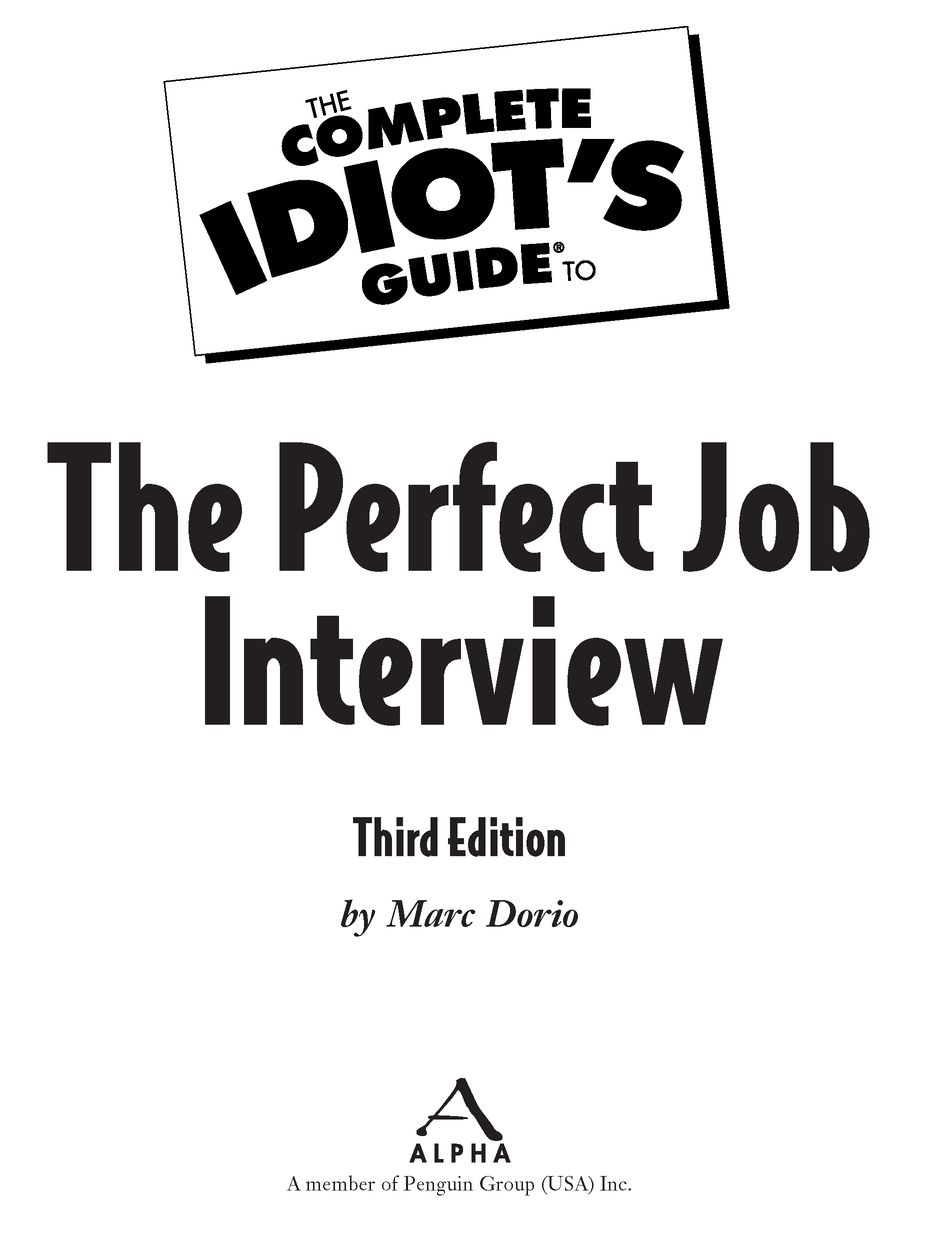Table of Contents
Foreword
How many times during a job search have well-intentioned friends or family members offered you advice on how to conduct yourself in an interview? I am willing to bet that these words of wisdom have for the most part been varied, confusing, and even contradictory.
One person tells you to be yourself, and dont hold back, while another suggests you play the game and dont get boxed in by the crafty interviewer. Really, with all this sage advice its no wonder that most job candidates approach the interview with the same enthusiasm as they would an IRS audit! There must be a better way.
Over the years, both as a corporate human-resources professional and now as an executive search consultant, I have personally interviewed hundreds of candidates for positions ranging from nonprofessional to top-level executives. These individuals have come from diverse countries and cultures. This interviewing experience has taught me two valuable lessons. The first is that preparation is key for interviewing success. What you do to get the interview in the first place, as well as preparing for it, is critical. Second, there is no pat way to interview. Each situation is unique. Flexibility and being able to correctly read each interviewers style is, therefore, essential for a job seeker to hit the mark. The Complete Idiots Guide to the Perfect Job Interview, Third Edition, will teach you both lessons and more.
Most books I have read on interviewing address only one issue; namely, how to conduct yourself during the interview itself. The Complete Idiots Guide to the Perfect Job Interview, Third Edition, certainly does that, and much, much more. This book offers practical and proven methods and techniques for getting an interview. The techniques contained in this book will enable you to research the marketplace and discover the potential employers needs. It will provide you with the skills to conduct a thorough job search, prepare for the interview, interview effectively, and negotiate the final offer. You will be able to do it all better than you have in the past.
Professional interviewers like myself can quickly assess a job candidates level of preparation and confidence. This book is an invaluable tool in your job search and career management tool box. Youll enjoy reading it and refer to it often.
William Myers
Vice President, Tarnow International Executive Search Consultants (formerly Corporate Vice President of Human Resources, International Flavors and Fragrances, Inc.)
Introduction
Question: How do you measure the effectiveness of a resum?
Obvious answer: Whether it gets you a job or not.
Try again. Because the obvious answer is wrong.
The objective of an effective resum (or cover letter, query letter, e-mail inquiry, cold call, and all the other early steps in the job hunt) is not to get you a job. It is to get you an interview. The job interview is your ultimate opportunity to sell yourself to an employer, even as you gauge whether that employer is right for you. It is a doorway to a job and a portal to a career.
At least, thats the way it is supposed to be.
Even as we joust and jockey in quest for that interview, many of us look forward to the event as we would to any grim interrogation. We think of it as an obstacle rather than an avenue to employment. Many of us are intimidated by a process that makes us feel small, inadequate, ineptlike a complete idiot.
Why a complete idiot?
Well we dont know what questions will be asked. Dont know if well be able to answer the questions when theyre asked. Maybe, too, we dont know how to dress for the interview. Dont know how to negotiate salary. Dont know enough about the job. Arent good at remembering names. Cant think on our feet. Are easily rattled and afraid of drooling.
Theres plenty of bad to feel about interviewinga process that should be filled with bright hopes and great expectations. A lot of us are afraid well just plain blow it. More than any other aspect of the job search, the interview is a mystery to most people. Even job hunters who are confident of their resum-writing ability and their expertise with a cover letter often feel unsure of themselves when it comes to interviewing.
If youre leery of the interview, well, at least youre in good company. But why stay there?
How to Use this Book
The Complete Idiots Guide to the Perfect Job Interview, Third Edition, cannot, of course, guarantee success. But reading this book will help you get excitedin a productive wayabout interviewing. It will help you see the interview as an opportunity rather than an obstacle, a positive event instead of a reason for terror. The Complete Idiots Guide to the Perfect Job Interview, Third Edition, is designed to take the mystery out of the interview by showing you how to read the employers needs and how to present yourself as the solution to the employers problems.
Heres what youll find in the pages that follow:
Part 1, Getting There, faces the fact that before you can ace an interview, you have to get an interview. Youll find advice on how to transform your resum, cold calls, and online queries into interviews, and how to prepare for those interviews so that youll come across as a winner. In this part of the book, youll also find pointers on looking the parthow (and how not) to dress.
Part 2, Being There, begins with what you need to know about interviewing online, then takes you into real life with valuable tips on what to do while waiting in the reception room: last-minute preparation and assessment, as well as exercises to keep you psyched up while youre trying to calm down. You wont find cut-and-dried interview scripts here, but far more useful tools to help you listen more effectively, to answer the most common questions, to answer the really tough questions, and to take charge of the interview and steer it in the direction you want to take it. All this leads up to a chapter on the bottom line: salary negotiation.
Part 3, Do You Have Any Questions? (Youd Better!), is devoted to the questions you should ask. These are designed not only to gather the information you need to evaluate an employer and an offer, but to help you close the sale and get that offer.
Part 4, Special Settings and Challenging Circumstances, explores many of the less typical, but still important, interview scenarios, including the informational interview that you arrange, the preliminary or screening interview, and the telephone interview. Youll also find tips for handling such situations as the mealtime interview, the panel interview, the sequential interview, and the automated or computer-assisted interview.
Part 5, On the Spot, is a special part on mastering performance and stress interviewscertainly the most intimidating and challenging of interview scenariosand turning employers objections into persuasive selling points.
Part 6, To Follow Through, Follow Up, covers the all-important post-meeting phase of the interview process, beginning with the follow-up interview and what to do, say, and write after all the interviewing is finally over.
Three appendixes bring up the rear, including a glossary of interview buzz words; sources of information, both in print and online, to help you prepare for an interview; and exercises to help you conduct an inventory of your skills.


